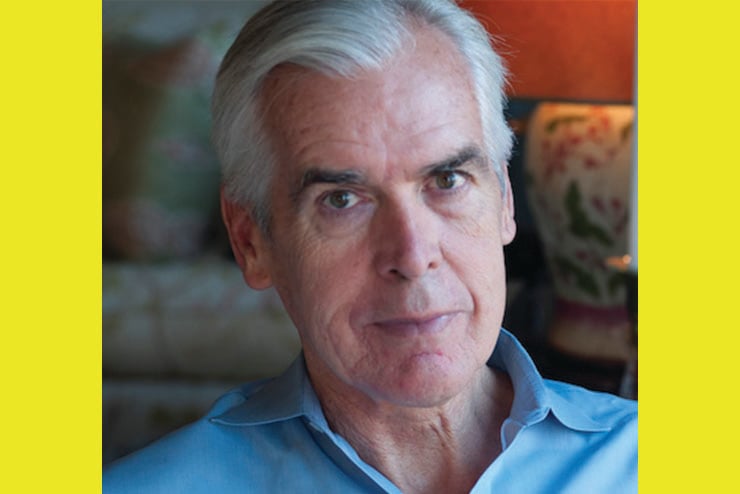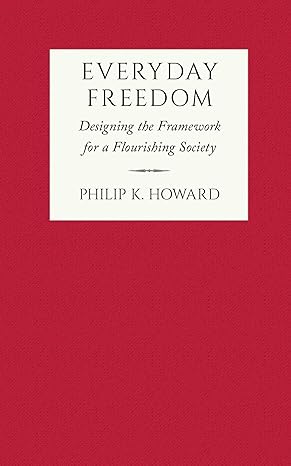Everyday Freedom: Designing the Framework for a Flourishing Society
by Philip K. Howard
Rodin Books
128 pp., $19.99
Philip Howard is not just a fancy white-shoe lawyer at a Washington law firm. He is the author now of seven thoughtful books on the law. His latest book, Everyday Freedom, provides a blueprint for shifting the focus of American law from the rights of the individual to the well-being of the community. It is also a critique of our modern administrative state (also known as “The Swamp”) and a plea for decentralization of authority and policy.
It is, in short, a well-timed neo-Tocquevillian polemic. In fact, if, through some unlikely and twisted time-travelling gene-splicing miracle, Alexis de Tocqueville, Socrates, and Oliver Wendell Holmes, Jr., could be combined, such a person would be like Philip Howard.
Like Tocqueville, Howard has been consumed by concern about how democracy works in America. For the Frenchman, the issue was how the rule of law, stability, morals, and the common good could be maintained without monarchy or aristocracy. Trained as a lawyer but born an aristocrat, Tocqueville was acutely aware of the deficiencies in the European established order, and, in the two volumes of his great classic, Democracy in America, he set out the most perceptive observations on American society ever given.
Tocqueville’s key insight was that democracy can only flourish when citizens take primary responsibility for their own welfare, through the establishment of intermediary organizations (the family, schools, churches, fraternal societies, universities, etc.) between the government and individuals.
Like Socrates, Howard is a gifted philosopher who believes the unexamined life is not worth living, and his books are thoughtful studies of how and why our legal system has gone badly wrong. Like the legendary Athenian, Howard has made himself a gadfly to prod others into doing what’s necessary for the virtuous life. He’s even created a nonpartisan nonprofit “reform coalition,” Common Good, to put his insights into practice. (A disclaimer: I am a member of Common Good’s Advisory Board).
Finally, like Oliver Wendell Holmes, Jr., who wrote in 1881 The Common Law, what one admirer, the gifted federal judge Richard Posner, called “the greatest law book ever written,” Howard appreciates that the law controls only part of our actions. Discretion in the application of the law is not only inescapable, but crucial to its success.
Howard follows in the steps of a plethora of Holmes-influenced legal scholars and judges, including Benjamin Cardozo, Roger Traynor, Richard Posner, Jack B. Weinstein, and Ronald Dworkin, who understood that the law was more about applying standards than following precisely formulated rules. Perhaps more clearly than any of these forbears did, however, Howard’s books have explained the major mistake American government made in the late 20th century. It believed that the most important thing it could do would be to protect individuals against unfair discrimination by binding all authority—economic, social, political, religious, or medical—through precise regulation.
Given America’s history of racial discrimination in particular, there was some nobility to that goal, but the result is the “overlawyered” society we have today. For example, the Federal Register containing all the federal proclamations, rules and regulations) is more than 70,000 pages long.
“For federal regulation alone, there are about 150 million words of binding legal requirements,” Howard writes. Major pieces of legislation passed by Congress are now incomprehensible thousand-page tomes. We have so many federal criminal provisions that one brilliant criminal defense lawyer, Harvey A. Silverglate, argued in 2011 that the average American professional is actually guilty of committing “three felonies a day” (which is also the title of one of his books). The “lawfare” waged against Donald Trump and his advocates and advisors has shown us Silverglate got it right. Our law has now become dangerously untethered from the community-based norms that Tocqueville and Holmes celebrated.
Howard wants to reestablish those norms, to reawaken the American entrepreneurial spirit, and to reign in or end the hegemony of the administrative state and its bureaucracy. Here is how Howard analyzes the anomic present state of our affairs:
Modern law tried to create a government better than people. No authority needed. But a system of rules without authority is central planning. Process without authority is paralysis. Self-defined rights against other citizens is tyranny. Authority in a democracy is merely another word for the freedom needed by officials to fulfill their responsibilities, subject always to review by other officials and judges. Take away the authority of people with responsibility, and a flourishing culture is soon replaced by futility and alienation.
The “people with responsibility” to which Howard refers are the front-line civic actors—for example, teachers who need to maintain discipline in the classroom, homeowners and businessmen who ought to be able to decide for themselves how to conduct their affairs, and state, county, and municipal officials confronted with varying demands for the allocation of resources, the rebuilding of infrastructure, or other problems of community maintenance.
In a Holmesian flourish, Howard explains that the mistake the legal “reformers” of the ’60s, ’70s, and ’80s made was also the mistake of their Enlightenment forbears, (also repeated by Friedrich Hayek), that all we needed to produce utopia was “clear law”:
‘clear law’ is generally a myth. Most of what government does is far too complicated to “go by the book”: Regulating safe products, permitting infrastructure, enforcing trade agreements, overseeing social facilities, procuring government contracts, not to mention running a school or police department, or presiding over a courtroom, all require officials and judges to exercise judgment.
Unfortunately, because of the risk of civil or criminal lawsuits coming from a failure to conform to ubiquitous and yet unworkable rules, today no one dares to engage in what the community requires.
Thus, Howard advocates a radical reduction in federal rules, to empower “everyday freedom,” by which he means the discretion individuals need to reinvigorate America’s economy and society. Specifically, Howard wants:
Congress to delegate the design of structures, area by area, to independent recodification commissions. Then the proposals can be put to a vote by Congress, weighing the costs and benefits of the overall package. That’s more or less how new legal codes have been adopted through history.
This will never happen in a Congress controlled by Democrats who are supported by trial lawyers who profit from our dysfunctional legal dystopia. Such reconstruction is not, however, beyond imagining in a Trump administration and a sympathetic Republican House and Senate.
This hopeful proposal will not come to fruition without a major change in the attitude that Americans have to authority, without increased trust in our public officials, and without a widespread movement to permit them to exercise judgement anchored in moral principles. Howard is not as explicit on this point, but the clues are there. This little book, then, should be read as a call for a moral re-awakening, and a plea to return a moral foundation to the public square.
Howard warns against officially mandated religious proselyting, but he recognizes, as did Tocqueville, the power of churches and other religious organizations to rebuild and maintain social structures. “The theology of law better than people has been drummed into our heads as virtuous,” he notes, appearing to imply that we might benefit from actual theology rather than law.
“Churches, despite their decline, are still the largest and most important institution of civil society,” Howard reminds us. If they are to lead the way in reestablishing authority, common sense, and the common good in American society, what are they to do, and what should be their guiding principles? Borrowing largely from the philosopher Michael Polanyi, but perhaps equally influenced by Socrates, Howard concludes his analysis by underscoring that the restoration of everyday freedom is in the service of restoring trust in authority, and of promoting human excellence, but excellence employed to further the betterment of the community.
What we have in this book, then, is a luminous and succinct argument for the repudiation of the Late 20th-century ethos of self-actualization and the reestablishment of an altruistic order embracing the classical virtues of courage, wisdom, temperance, and justice, and the theological virtues of faith, hope, and charity. The establishment of what this scion of Socrates, Tocqueville, and Holmes seeks will not be easy in our partisan and corrupt polity, but even the remote possibility of renewal is enhanced by the inspiration he offers.


Leave a Reply